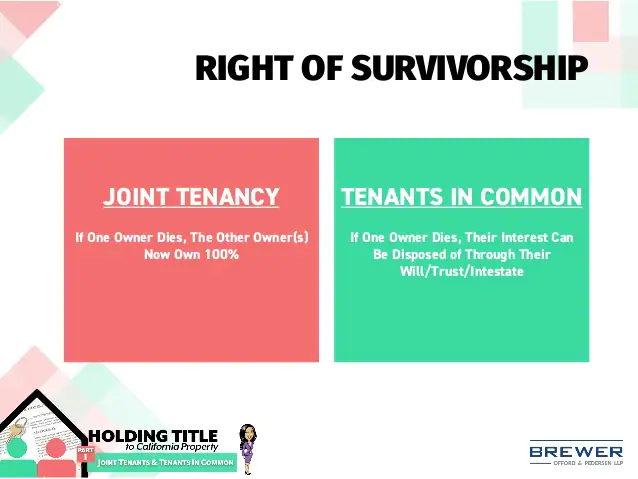Tenancy in common permits two or more even individuals to have possession interests in assets. Every owner has the due right to give their share of the asset to any beneficiary when the owner is dead. Tenancy in common is unique in such a manner that the handover of the property to the beneficiary when the owner dies. The property is owned equally by each member. Therefore, a person may not be able to claim ownership of any single property or even a section of the property (Duncan, 2014). Moreover, when the co-owner of the property wants to sell the property, they may file a petition, and after the asset is sold, then the proceeds will be divided equally among the members.
A group of people may come together to wonder about a property. They will have an equal share and have the same deed and interest. In some countries, couples automatically become joint tenancies, while in others have a common tenancy. A joint tenancy may be terminated when the parties sell their interest in the asset. For instance, when one or more members owning the property buy out other members, then the property is sold, and the proceeds are equally distributed among the members, or a potion may be filed to allow one member or group to sell their stake that is in the property (Andersson, Ehlers & Svensson, 2016). Since tenancy-in-common terms do not legally share a property, several jurisdictions do not separately assign every owner a property revenue bill based on their stakes is contractually distributed to each owner. Overall a common tenancy is a particular sort of concurrent ownership of property by parties.
One of the cases entails the Court of Appeals of Utah, in which Sam Ashworth, Plaintiff, as well as the appellant versus Murph Bullock; Defendant as well as the Appellee. Sam Ashworth appealed to get the declaratory judgment establishing that Murph Bullock, together with his wife known as Cecelia Bullock, are the real owners of the property in Payson, Utah. To give a brief background, in 1976, the Bates family and Harris held the assets as joint tenants that had a right of survivorship. The Bullocks family resided in a home situated on the Property, which was under verbal rental terms with Bates. Both parties had never met and were not aware that one of the parties had an ownership concern in the Property (Iglesias, 2017). There was an attempt to sell the property attempted by Bullocks, which the courts allowed because there was no element of forgery in the writings.
The second case is about Swartzbaugh versus Sampson. The appeal was made to cancel two leases that were authorized by John Josiah Swartzbaugh (lessor); to Sam Sampson (lessee) concerning two adjacent parcels of land. The motion for the nonsuit was approved at the end of the plaintiff’s case, and the appeal followed.
In summary, the type of ownership in which one takes their property may significantly affect the manner in which one may use the property, share it and give it to other people since there are advantages as well as consequences to taking the title to assets bye every one of the means described in the agreement. It is essential to take understand and consider before getting into an agreement to own a property.
